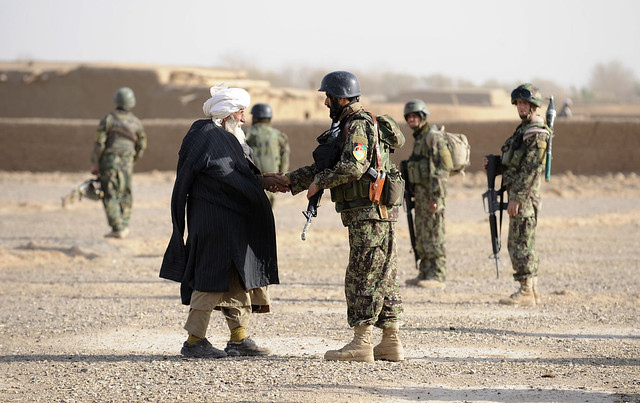 Britain’s battered military mission in Afghanistan badly needed a shot in the arm. Morgan Roach heard Liam Fox making a clearcut case to a conservative thinktank in Washington on the rationale for continued intervention and on the trajectory for future developments.
Britain’s battered military mission in Afghanistan badly needed a shot in the arm. Morgan Roach heard Liam Fox making a clearcut case to a conservative thinktank in Washington on the rationale for continued intervention and on the trajectory for future developments.
In the first six and half months of 2010, 266 British and American soldiers have lost their lives in Afghanistan. It is certain also that more soldiers’ lives will continue to be lost as the war progresses. And public support in the United Kingdom and the United States for the war in Afghanistan remains low.
Yet in a speech at The Heritage Foundation in Washington on 30 June, Britain’s Secretary of State for Defence Liam Fox reminded his audience why Britain is resolutely committed to fulfilling its mission as a NATO ally. He re-outlined Britain’s three-step approach to success in Afghanistan:
– stifle the threat from the Taliban-led insurgency,
– reduce this to a level where the Afghan government can effectively lead, and
– establish a system of national security and governance that the Afghan government will control for the long-term.
Fox argued that the last point especially is a process: “There is no group of commanders waiting patiently in a tent awaiting a delegation under a white flag offering a formal surrender. Insurgencies usually end with political settlements not military victories.”

The situation is not cut and dry. Of course, setting deadlines for success is often politically motivated, but in a fluid situation it may be unrealistic. President Barack Obama still appears committed to an assumption that he will give the order for U.S. troops to start returning home in July 2011. Critics in the USA argue that such actions could potentially spell the end of any progress gained. Problems of maintaining commitment are made worse as by inequitable burden-sharing among NATO allies. European commitment to the mission is also limited: France and Germany’s combined forces within ISAF fall well short of Britain’s contribution.
And yet, despite all this, Britain stands firm in its commitment. In a recent BBC interview Fox suggested that as British troops are stationed in the most dangerous parts of Afghanistan, they will likely to be the last to leave. He argued that although “we want to transition to Afghan authority as soon as we can… we cannot leave a security vacuum.”
Supporters of the current action argue that although NATO allies have lost considerable blood and treasure and these losses are deeply tragic, yet still the NATO mission must prevail. If troops were to leave prematurely, Afghanistan would be vulnerable to a resurgence in terrorism and regress to a safe haven for al Qaeda – and this falling back would be quickly followed by large areas of Pakistan, a nuclear-armed country of more than 150 million people.
Although the mission has seen numerous setbacks Fox emphasized in his speech that “we are making progress.” The strengthening of the Afghan Army is just one example. In just the past few months, its force capacity has grown by 20 percent and it is now 125,000 strong. Additionally, US estimates are that the number of insurgents active in Afghanistan is decreasing. Since 2006, Helmand province has been one of the most dangerous areas for American and British forces, along with those from Denmark, Estonia and Georgia. Yet coalition troops have returned over three quarters of the region to Afghan government control. Such gains bring real results, ones that allow reconstruction and development to take hold and eventually create some semblance of stability and normalcy.
National governments with troops in Afghanistan, and suffering from criticism and low opinion polls at home, face challenges to constantly remind their citizens that action at a distance can often be the most successful form of defence – one of the primary rationales for intervening over such a long period in Afghanistan. Liam Fox argued that the UK must stay the course and “stand shoulder to shoulder…alongside our many partners and alongside the Afghans themselves.” Should NATO’s ISAF troops leave Afghanistan prematurely, there is little doubt that Afghanistan will return to its previous state of internal anarchy, creating a risk that the USA and European nations will once again be subject to terrorist attacks emanating from the same sources as in 2001.





